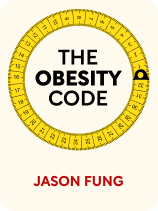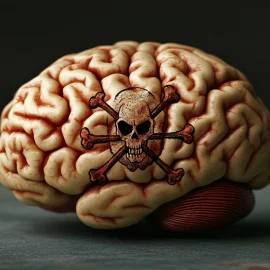

This article is an excerpt from the Shortform book guide to "The Obesity Code" by Jason Fung. Shortform has the world's best summaries and analyses of books you should be reading.
Like this article? Sign up for a free trial here .
What exactly is the “set weight”? What role does your set weight play in fat gain? What happens when you fall below your set weight?
Your set weight is the default weight your body seeks to maintain—it’s a homeostatic mechanism. Once you fall beneath that set weight, your body will compel you to eat and regain any weight you’ve lost. That’s why many people see excess weight come back once they get off a diet.
Here’s how your body seeks to sustain your set weight, preventing you from keeping the lost weight off.
Fat Storage Depends on Your Set Weight
Fat storage hinges on the interaction between insulin and your “set weight.” Simply put, normal insulin levels stimulate your body to store a fixed amount of fat, depending on how small or large you are. That amount of fat is called your set weight, and your body constantly works to maintain it.
If you fall beneath your set weight, your body will store calories as fat in order to reach it. If you go above your set weight, your body will increase your metabolism to burn off fat and reach it. This works similarly to cruise control in a car. Set at 55 mph, you can brake or accelerate but, when left alone, the car will always return to 55 mph.
Fung explains that if your insulin levels become chronically high, your set weight increases. Returning to the car analogy, chronically high insulin levels increase the cruise control setting—locking you in at a “higher speed.” Set weight sets the amount of fat you store, so if your set weight becomes abnormally high, your body thinks that you have insufficient fat stores. To correct this, three things change:
- It decreases metabolism, lowering your body’s energy expenditure so that more food energy can become fat.
- It decreases satiety—insulin suppresses leptin, a hormone that makes you feel full, so that you struggle to feel satiated.
- It increases hunger, prompting you to eat enough to reach that higher set weight.
(Shortform note: Fung acknowledges that we don’t yet know the exact mechanisms that control set weight. Some studies have shown that in mice, damage to the hypothalamus (a region of the brain thought to influence set weight) can cause a permanent change in body fat levels. Another intervention that can change someone’s set point is bariatric surgery, a range of procedures wherein surgeons remove parts of the stomach or reroute food past it altogether. This reduces food absorption and lowers the set point. Exact mechanisms remain unknown, though these surgeries seem to decrease appetite and normalize metabolism—the opposite effect of the changes Fung describes above.)
This effectively compels you to overeat in order to store fat until you reach the weight your body “thinks” it should be at. Thus, Fung argues, obesity isn’t caused by overeating—overeating is caused by obesity. The term “obesity” refers to the hormonal problem, and the resulting fatness is the main symptom.
(Shortform note: If we take Fung’s above assertion as true, then our common perception that “obesity = being fat” is wrong. Further, the notion that obesity means being fat likely contributes to the stigmatization of obese people. If, on the other hand, we accept that fatness and overeating are symptoms of an underlying disease, public perception of obesity could change. As an analogy, consider if we shamed cancer patients for being sickly. Doing so seems absurd—those conditions result from the cancer, so there’s no reason to stigmatize them.)
Several factors contribute to the chronically high insulin levels that raise your set weight and cause obesity. They fall into two categories: what you eat, or diet composition, and when you eat, or meal timing.
Change When You Eat
In the short term, most diets produce weight loss. However, dieting alone can’t fix obesity, because dieting doesn’t lower your set weight. To lower your set weight, Fung recommends intermittent fasting. Intermittent fasting is an eating pattern wherein you intentionally stop eating for a stretch of time. Research has shown that regular fasting reduces insulin resistance, lowering your set weight and allowing you to steadily lose fat.
Fung explains that when you fast beyond 24 hours, insulin levels fall and your body begins to derive energy from your stored glycogen and fat. Beyond two to three days, ketosis kicks in: Fat becomes your body’s main energy source, producing three energy molecules—glucose, fatty acids, and ketones—that fuel your body and brain. (Shortform note: Stephens calls ketosis your “fat-burning superpower,” and she encourages people to embrace fasting as an enjoyable lifestyle rather than self-deprivation. In Stephens’s view, the benefits of fasting vastly outweigh not eating as often—and she says that in time, you won’t even want to eat all the time.)
According to Fung, fasting is a time-honored practice that humans have used to maintain good health for thousands of years. During our hunter-gatherer past, food was periodically scarce. To handle this, our bodies adapted to store fat as a back-up energy source in times of need. Since then, physicians in ancient cultures, such as ancient Greece, have lauded fasting as a powerful cure for many illnesses. Many religions prescribe fasting as a regular “purification” practice, and over three billion Muslims, Christians, and Buddhists fast as a normal part of life.
While some worry that fasting is unhealthy, Fung explains that these concerns are misplaced. He argues that fasting does not cause your body to consume your muscles for fuel, damage your metabolism, deplete your blood sugar, or deprive you of essential nutrients. In contrast, studies show that fasting regulates blood sugar and electrolytes, produces an increase in human growth hormone that conserves your muscles, and increases your metabolism once ketosis kicks in. For these reasons, Fung asserts that anyone can fast successfully and reap powerful health benefits.

———End of Preview———
Like what you just read? Read the rest of the world's best book summary and analysis of Jason Fung's "The Obesity Code" at Shortform .
Here's what you'll find in our full The Obesity Code summary :
- Why everything we were taught about obesity is wrong
- The theory of obesity as a hormonal disorder that causes overeating
- Why dieting doesn’t work and exercise actually has little impact on weight loss






